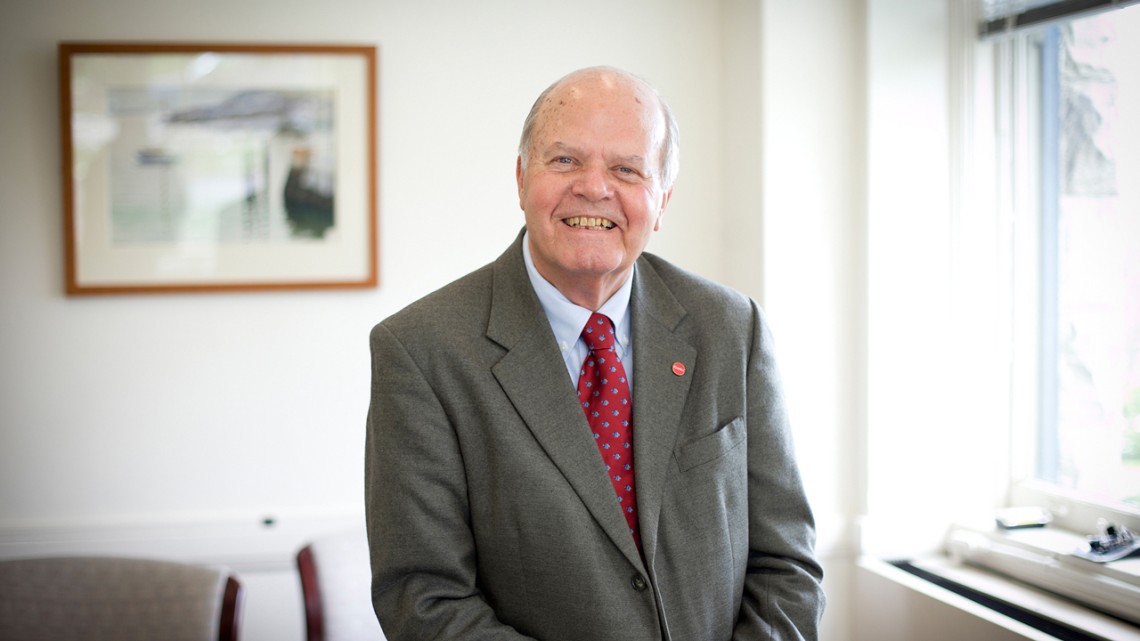
Charles Walcott, Ph.D. ’59, plans to retire later this year as university ombudsman.
Funny name, rewarding job: University seeks ombudsman
By James Dean
The name may be unfamiliar. Those who seek its services can remain anonymous. And the outcome is always confidential.
For 52 years, the independent Office of the University Ombudsman has provided a space for faculty, students and staff to engage in candid and confidential discussions about academic or workplace concerns, and to obtain guidance.
“It’s a funny name, and people don’t really understand what the function of an ombudsman’s office is,” said Charles Walcott, Ph.D. ’59, who plans to retire later this year as university ombudsman, the part-time position he’s held for a decade. “It’s a continued battle, as it were, to get the word out and explain what this title actually means and what it is we do that’s helpful for the community.”
During his 40-year career at Cornell, Walcott, a professor emeritus of neurobiology and behavior in the College of Agriculture and Life Sciences, has directed the Lab of Ornithology and served as dean of the University Faculty and chair of the University Assembly. He continues to educate colleagues about the role of the university ombudsman, established at Cornell in 1969 and historically held by a senior faculty member.
Walcott said the office has worked with faculty members up for tenure, graduate students with a committee concern or undergraduates with a financial aid problem. Other issues could range from advising, accommodations and performance appraisals to academic misconduct, the judicial system and ethics reviews.
“We try to help people take advantage of Cornell and its various resources and try to help them when they have problems or difficulties,” Walcott said. “The distinction is that it’s a totally confidential place. You can come and talk with one of us about issues with the total confidence that the conversation will not go anywhere at all.”
The office welcomes 300 to 400 visitors in a typical year with a “zero barrier” policy, meaning someone need not identify themselves or provide any advance information to have a meeting. Visitors might require one or multiple conversations to work through their issues.
The ombudsman – derived from a Scandinavian word meaning “representative” or “proxy,” according to the International Ombudsman Association – does not take sides or play any formal role in disputes, but seeks to facilitate fair and equitable outcomes before problems escalate or become entrenched.
The office may refer visitors to the right resources or help explain potential courses of action and their consequences. Acting as a trusted “insider outsider,” the office may occasionally act as an intermediary to someone in a position of authority, maintaining confidentiality.
“It’s partly opening doors, it’s partly just offering suggestions,” Walcott said.
The university ombudsman also provides “upward feedback” to administrators if it detects a recurring issue that merits their attention, again without divulging personally identifiable information.
In addition to Walcott, the office is staffed by Linda Falkson ’86, the director and a certified ombudsman; and Tracey Brant ’84, assistant ombudsman. With the exception of Weill Cornell Medicine, which has a faculty ombudsman, the team serves all Cornell units across New York state and beyond, including Cornell Tech in New York City.
Faculty interested in succeeding Walcott may nominate themselves or others for a renewable two-year term as university ombudsman by emailing the search committee at ombudsearch@cornell.edu.
Falkson said Walcott brought to the position not only his extensive knowledge of Cornell’s policies, protocols, culture and administration, but also his empathy for others.
“He brings a gentle kindness and understanding of the human condition,” Falkson said. “He cares about our community members, and I think that’s why he has been successful in this role.”
Once a new ombudsman is in place, Walcott, an expert on animal navigation and the territorial vocalizations of birds, plans to continue both advising and teaching students, and his research into how spiders hear with their legs.
Though he’s not at liberty to share many details about his mostly confidential work as university ombudsman, Walcott said he’s derived satisfaction from the “succession of small victories” achieved on behalf of visitors.
“It’s been thoroughly rewarding,” Walcott said, “because you get the feeling that you really can help people. And that’s a very nice feeling.”
Media Contact
Get Cornell news delivered right to your inbox.
Subscribe
